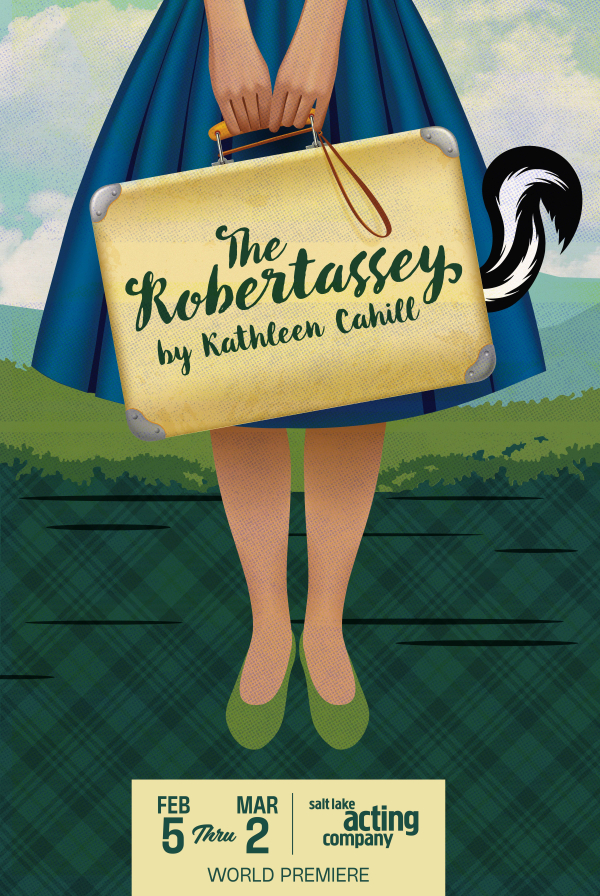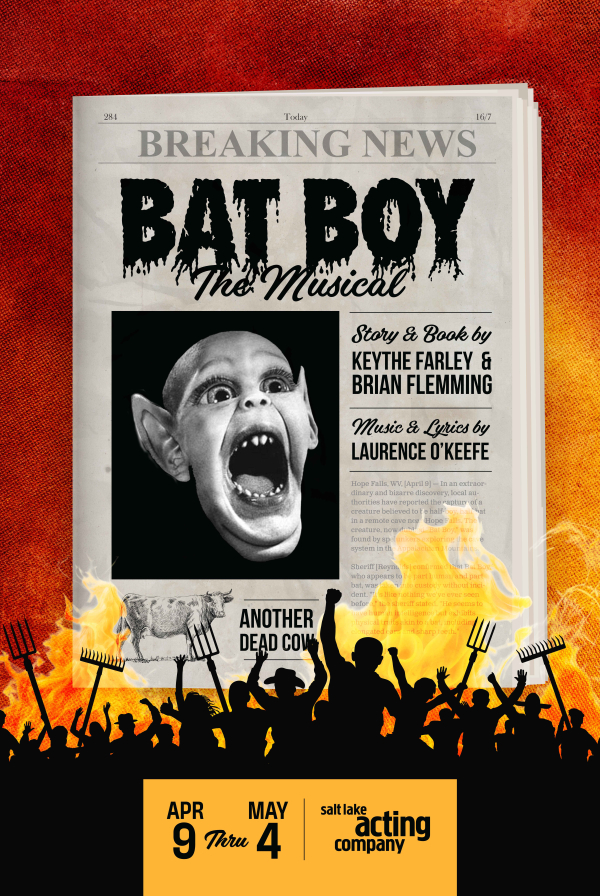SLAC Premieres Steve Yockey’s Mercury as it Delves into Obsession and Revenge
Front Row Reviewers | Jason Hagey | October 16 2017
Mercury at Salt Lake Acting Company (SLAC) in Salt Lake City Utah is as horror-comedy at its most delightful and a play that is ultimately about humanity and the zeitgeist of our times. It is a masterclass in how to elevate a horror above gore and a comedy above stereotype. There are no cheap scares. There are no simple stereotypes. Instead, the playwright, Steve Yockey, focuses on character and plot, and creates a bloody and funny “thinker” about our common human experience.
Like the best stories, Mercury jumps right into the action. Heather (Brighton Hertford) enters the home of Pamela (Dee-Dee Darby-Duffin as Pamela is trying to arrange her several pots of cacti (“antisocial tombstones”). Heather wants to talk about their relationship under the pretense of looking for her missing dog. Though both women are married, the intimation is that the two women have had a very passionate love affair that, for whatever reason, has gone sideways and now they are not on good terms. Darby-Duffin does a fabulous job of being both frightening and sympathetic. Hertford is immediately likeable, and has an effusive “girl next door” (which she literally is in the play) characterization, but listening to the nuance of her performance means seeing that she is very different than her well-put-together facade.
The following scene begins our descent into the madness without giving us too much of exactly what is going on. We meet April Fossen (Olive) as she enters a “curio shop” that is purveyed by Lily Hye Soo Dixon (Alicia). Olive comes to Alicia’s shop for help in dealing with Brian (Tito Livas), a man who just moved in. Olive has a “meddling neighbor” vibe, and Fossen’s performance is perfect as the neighbor who should just keep to her own business. At first, Alicia appears to be eccentric but otherwise normal. Through some kind of radio system, her significant other, Aaron Adams (Sam), interrupts Olive and Alicia’s conversation throughout the scene. This tells the audience that something else is going on, but it is hidden somewhere. To make the characters even more mysterious, the set is built on a turntable. Alicia is the only character who moves the turntable so we can go into the homes and lives of our various characters. She has control over what we witness. Alicia’s turning of the stage reminded me of Bert in the stage adaptation of Mary Poppins; sweeping in and out the various sets as transitions. This act of controlling the scenery makes Alicia automatically otherworldly. I couldn’t help but wonder who she was and what she was about. The suspense grows as she provides a package to Olive that is intended to solve her problems, but all solutions have a caveat: there are possible, undesired consequences to the use of said package. Let’s just say, when we finally meet Sam, it is fantastic, while being understated, and profoundly interesting.
Max Huftalin (Nick), who recently moved into the apartment above Olive, has a live-in boyfriend Brian. Nick is a nice, polite young man, just as Olive describes him. Brian is a petulant boyfriend, also as Olive describes him. Nick has moved into his mother’s apartment to tend to it and take care of her in the hospital. Brian has come along for the ride, even procures a job as a physician’s assistant, but is not happy about the situation. Brian likes living in the urban areas of Portland and has been taken to a place much more rural; the place has bears and other wild animals. This has made him question his relationship to Nick. The truth is, both Huftalin and Livas give performances that are simply loveable; the two are adorable in their dichotomy and make the show fun to watch (and it helps that Brian running around in his underwear is wonderfully absurd).
The mythos of the play is well-developed, but never explained. As an audience, we aren’t given much except things as they are right here and now. We are asked to accept the premise of the situation and, in doing so, we are taken down a ruckus rabbit hole of horror tropes turned on their ear to create plenty of belly laughs and snickers. This is a horror-comedy that never forgets itself.
Too often, horror is about pretty people looking scared and providing quick shocks. Mercury builds on audience identification through believable scenarios and good acting. The actors feel like real people and not caricatures. With comedy, you are usually given a realistic scenario that is then twisted and taken to an extreme. In Mercury, they take the basic breakdown of a comedy and add another contextual layer: that of horror. This creates the tension that Yockey leverages with charming effect. In Yockey’s reality, when hexes and curses become involved, everyday life becomes something altogether horrific and hilarious.
Mercury maintains a strong sense of genre while leaving room for performance, giving the horror a human dimension that makes the comedy all the more fun to watch. Director Shannon Musgrave probably encapsulates the fun of the show when she writes about “debating the length of time at which torturous screams become comedic.” The show, however, is poignant social commentary and Musgrave goes on to point out, “I think now (for better or worse) is the perfect time for a play like MERCURY – when we’re right on the edge of losing our empathy, and our definitions of right and wrong can so often be at odds with those of our neighbors.” Musgrave worked hard to keep the production grounded while pushing us into a diegetic reality that begs us to think about justice, what is right and what is wrong, and reminds us that too much of society is focused on themselves. Musgrave never is didactic, but when you step back and think about the play, you realize that it is scathing commentary. There is nothing about the production that is black or white, and no character has cornered the market on righteousness. Musgrave instead holds up a mirror (albeit one that exists in pitch-black fantasy) to our current socio-political reality and asks us to evaluate our relationship and our neighbors. Hopefully when we do so, Mercury won’t be in retrograde.
*CONTENT ADVISORY: This play contains adult language and nudity. Recommended for mature audiences.
Mercury is performed in the upper theatre at SLAC (an old converted church building). You can park anywhere on the street and in the parking for the elementary school directly across from the theater.
The show runs about 90 minutes with no intermission.
SLAC presents Mercury by Steve Yockey
Salt Lake Acting Company 168 500 N, Salt Lake City, UT 84103
Oct. 11-Nov. 12 Wednesday-Saturday 7:30 PM, Sunday 1:00 PM, 6:00 PM, Oct. 31 7:30 PM, Nov. 11 2:00 PM
Tickets: $24-$43 with discounts for students, seniors, groups and those under 30
Contact: (801) 363-7522














